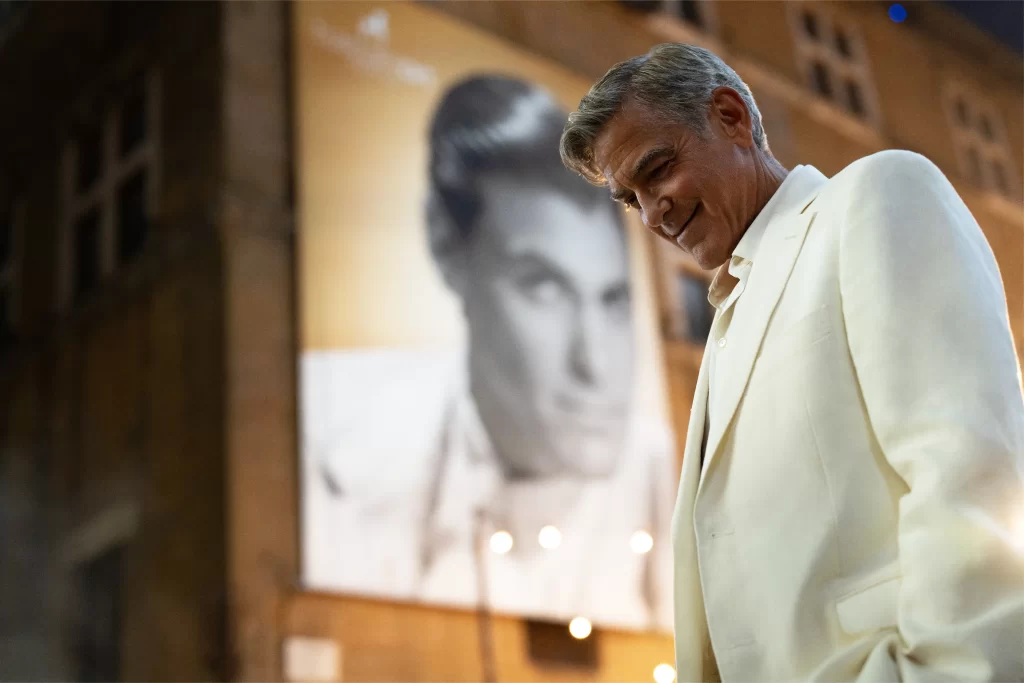The moment when I checked out of Springsteen: Deliver Me from Nowhere came early, when the Boss (Jeremy Allen White) goes to buy a new car. The friendly salesman refers to him as a rock star, adding conspiratorially, “I do know who you are,” to which Springsteen responds, “Well, that makes one of us.”
It’s a moment that signifies everything that’s wrong with the current epidemic of boomer-friendly rock-star biopics: a patently false, comically phony moment, entirely free of subtext or subtlety, conveying information in the most flat and undramatic manner imaginable. It’s a moment that would get you tossed out of any beginning screenwriter’s class, but audiences just shrug and accept it because no one’s going to these movies to be surprised. They’re there for the same reason they’re at a jukebox musical on Broadway: to hear the hits.
What’s disappointing is that so many fine filmmakers are spending their time and energy on boilerplate brand maintenance exercises for millionaires. Scott Cooper is a hit-and-miss filmmaker, to be sure (if I never see Black Mass again, it’ll be too soon), but he’s directed good films: Out of the Furnace, Hostiles, The Pale Blue Eye, and especially Crazy Heart, a drama about a fictional singer/songwriter that probably made it seem like a good idea for him to make a movie about Bruce Springsteen.
To his credit, Deliver Me from Nowhere doesn’t try to be a cradle-to-grave biopic, instead focusing on the period in which Springsteen wrote and recorded the 1982 Nebraska album, a personal and professional inflection point. His previous album The River had been a big hit, so his record company is anxious for a follow-up: “The iron’s hot!” says Al Teller (David Krumholz). “We think that he’s gonna hit it out of the park!” (Everyone in this movie talks like that.)
The best material here (most of it from Warren Zanes’s non-fiction book about the album) digs into the particulars of his process. We see how Springsteen finds the title song, which unlocks the feel of the album: he stumbles on Badlands on TV one night, slams through microfiche at the library reading about Charles Starkweather, puts words on the page, tries chords on his axe. He finds the sound, unexpectedly, in the wonky home studio four-track set-up that he initially intends simply for working out songs, only to find that “Whatever’s off sounds just right to me,” so they spend night after night in the studio, struggling to recapture the quality of the demos. He finally tells his engineers to make that dirty cassette recording into a releasable album, and the mechanics of that process are fascinating — presumably because we haven’t seen them dramatized in 30 other movies.

Cooper is not so skilled at portraying the process of putting an album together (Springsteen writes “SONG LIST” on a piece of notebook paper, jots down songs, and then writes “DOUBLE ALBUM??”) or at visualizing the music. “Atlantic City” is explained by a corny boardwalk montage; the opening line of “My Father’s House,” “I heard the wind rustling through the trees,” is accompanied by… a shot of Bruce as a child, sitting by a tree. And yes, despite the narrow focus on the Nebraska era, Cooper indulges in trite, black-and-white flashbacks of Bruce as a child, detailing his strained relationship with his father; the less said about these scenes, the better.
Jeremy Allen White, a terrific actor, makes no impression at all as Bruce; he never finds a way to play Springsteen as a character rather than a myth, and Cooper’s script certainly doesn’t provide him with one. Odessa Young, unknown to me, is charming as love interest Faye Romano (a composite character), and she and White generate plenty of chemistry. But it’s the most dusty-ass, done-to-death excuse for a relationship subplot imaginable — he has intimacy issues, you see, so she has to say things like “I just wish you’d let me in” and “This is about you runnin’ away from everything that scares you.” It feels like there are key scenes missing from the middle of the relationship, but maybe they figured we didn’t need them, since we’ve seen it so many times before.
Jeremy Strong is good, grounded and centered, as Springsteen’s manager and producer Jon Landau, whose job is to “deal with the noise,” and he does his best to convey that push-pull, trying to be supportive and simultaneously satisfy the suits. His well-placed looks of quiet resignation do a lot of work, but even he can’t do anything with the reams of expositional dialogue and psychological insights that he’s forced to try to pass off as dialogue. (Grace Gummer, as his wife, has the even more unfortunate job of existing solely to listen to those lines, and nod with understanding.)
Actors like movies like Springsteen: Deliver Me from Nowhere because they allow them to play dress-up, to wow Oscar viewers not with the skill of their acting but with the aptitude of their impersonation. (As White and the stand-in E Street Band roar through a full performance of “Born in the U.S.A.,” I realized what I was watching was less a movie than an expensive episode of Celebrity Lip-Synch Battle.) Audiences like movies like this because they don’t ask anything of them; they know the story that’s being told, the fans in its specifics and the casuals in the never-shifting arc of the music biopic, they know the songs that are being sung, and they know exactly how they’re going to make them feel. It’s what passes for moviemaking for adults these days, simply because the hot star of the moment is dressed up as a rock star rather than a superhero, but the impulse is the same: people who go to the movies for the experience, memorably defined by @dril, as “thinking about shit that i Recognize and smiling.”
D
“Springsteen: Deliver Me From Nowhere” is in theaters this weekend.



